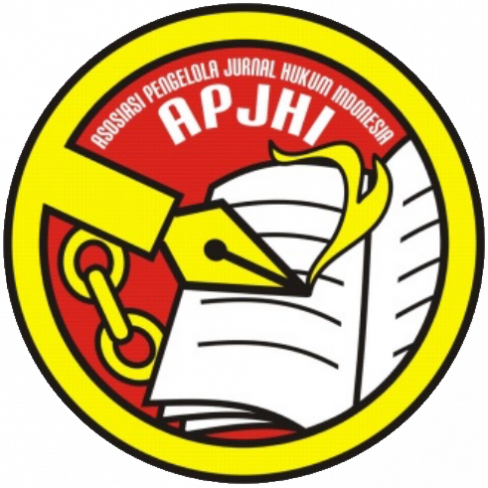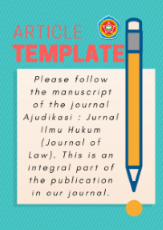Politik Hukum Pembentukan Peraturan Perundang-Undangan Pasca Perubahan Kedua Undang-Undang Nomor 12 Tahun 2011
DOI:
https://doi.org/10.30656/ajudikasi.v7i1.6483Keywords:
Legislation, Law-Making Process, Participation, OmnibusAbstract
Article 22A of the 1945 Constitution of the Republic of Indonesia mandates the establishment of a rule regarding the law-making process, which serves as a guideline for the law-making process from its inception until the regulation is enacted to the public. However, in its implementation, problems are still related to the law-making process in Indonesia. This normative research uses a statutory and conceptual approach that specifically looks at "over regulated" or "legal obesity†to analyze the legal politics of the formation of laws and regulations after the second amendment of Law Number 12 of 2011 concerning the Establishment of Laws and Regulations. In this context, there is an overlap between one law and another, which creates sectoral egos and results in legal uncertainty in its application. One of the causes of this legal obesity is the lack of regularity in the law-making process. In this case, legislators do not always refer to the guidelines for the law-making process and the principles for forming statutory regulations as stipulated in the law-making process regulation. In addition, the law still needs to be optimal in fulfilling meaningful participation. Therefore, the author will analyze the politics of law of the amendments of law-making process regulation after the Constitutional Court Decision Number 91/PUU-XVIII/2020, which includes accommodating the omnibus method and the concept of meaningful community participation as a solution for overlapping legislation in Indonesia.
Downloads
References
Arinanto, Satya. Politik Hukum 2. Jakarta: Program Pascasarjana Fakultas Hukum Universitas Indonesia, 2018.
Audrey O’Brien & Marc Bosc, eds. House of Commons Procedure and Practice, 2nd Ed. Cowansville, QC: House of Commons & Éditions Yvon Blais, 2009.
Bappenas. Pedoman Penerapan Reformasi Regulasi. Jakarta: Bappenas, 2011.
Black. H.C., Black’s Law Dictionary: Definitions of the Terms and Phrases of American and English Jurisprudence, Ancient and Modern, (6th ed.), St. Paul, Minn: West Publishing, 1990.
BPHN, Kementerian Hukum dan Hak Asasi Manusia Republik Indonesia. 2019. “Pedoman Evaluasi Peraturan Perundang-Undangan.†Kemenkumham. Kementerian Hukum dan Hak Asasi Manusia Republik Indonesia.
Ferry Irawan Febriansyah, “Konsep Pembentukan Peraturan Perundang-Undangan di Indonesiaâ€, Jurnal Perspektif Vol. XXI No, 3 (September 2016).
Habibi dan Muchtar Sani, “Jalan Panjang Mengobati Obesitas Regulasiâ€, Jurnal Legislasi Indonesia Vol. 19 No.2 (2022).
Husnayati Erni, Partisipasi Masyarakat dalam Proses Pembentukan Undang-Undang No 17 Tahun 2013 tentang Organisasi Kemasyarakatan, Thesis, Fak. Hukum,Universitas Indonesia, 2004.
Ibnu Sina Chandranegara. “Bentuk-Bentuk Perampingan dan Harmonisasi Regulasi, Jurnal Hukum IUS QUIA IUSTUM No. 3 Vol. 26 (September 2019).
Indonesia, Undang-Undang Pembentukan Peraturan Perundang-Undangan, UU No. 12 Tahun 2011, LN No. 82 Tahun 2011, TLN No. 5234, Penjelasan.
Mahkamah Konstitusi Republik Indonesia, Putusan MK No. 91/PUU-XVIII/2020.
Manan, Bagir. Dasar-Dasar Konstitusional Peraturan Perundang-Undangan Nasional. Padang: Fakultas Hukum Universitas Andalas, 1994.
Mattalatta, Andi. “Politik Hukum Perundang-Undangan.†Jurnal Legislasi Indonesia 6 (2009): 572.
Michel Bédard, “Omnibus Bills: Frequently Asked Questionsâ€, Publication Paper No. 2012-79-E, 1 Oktober 2012, online: <https://lop.parl.ca/sites/PublicWebsite/default/en_CA/ResearchPublications/201279E#txt5>
Moh. Mahfud, MD. Membangun Politik Hukum, Menegakkan Konstitusi. Jakarta: Pustaka
Na’a, I Gde Pantja Astawa dan Suprin. Dinamika Hukum dan Ilmu Perundang-Undangan di Indonesia. Bandung: PT. ALUMNI, 2012.
Nur Aji Pratama, “Meaningful Participation Sebagai Upaya Kompromi Idee Des Recht Pasca Putusan MK No. 91/PUU-XVIII/2020, Jurnal Crepido Vol. 4 No. 2 (November 2022).
Omnibus bills in theory and practice,†online: < https://www.thefreelibrary.com/Omnibus+bills+in+theory+and+practice.-a0328162667 >
Omnibus regulation: Council adopts new, simplified, agricultural rulesâ€, online: < https://www.consilium.europa.eu/en/press/press-releases/2017/12/12/omnibus-regulation-council-adopts-new-simplified-agricultural-rules/ >
Omnibus regulation: simpler rules for use of EU funds adoptedâ€, online: < https://www.consilium.europa.eu/en/press/press-releases/2018/07/16/omnibus-regulation-simpler-rules-for-use-of-eu-funds-adopted/ >
PE-CONS 56/17, online: < https://www.consilium.europa.eu/media/32072/pe00056en17.pdf >
Rahardjo, Satjipto. Ilmu Hukum. Bandung: Citra Aditya Bakti, 1991.
Rizaty, Monavia Ayu. Hari Konstitusi, Berapa Jumlah Peraturan di Indonesia?, n.d. dataindonesia.id.
Saragih, Bintan R. Politik Hukum. Bandung: Utomo, 2006.
Supriyadi, “Gagasan Penggunaan Metode Omnibus Law dalam Pembentukan Peraturan Daerahâ€, Jurnal Ilmiah Kebijakan Hukum Vol. 15 No. 2 (2021).
Susi Dwi Harijanti, Lailani Sungkar, Wicaksana Dramanda. “Laporan Hasil Penelitian Pengujian Formil Undang-Undang oleh Mahkamah Konstitusi: Urgensi dan Batu Uji.†Bandung: Fakultas Hukum Universitas Padjadjaran, 2020.
Toruan, H.D.L., “Pembentukan Regulasi Badan Usaha dengan Model Omnibus Lawâ€, Jurnal Hukum to-ra Vol. 3 No. 1 (2017).
Turkey: Omnibus Bill Dated 11.09.2014â€, online: < https://www.mondaq.com/turkey/CorporateCommercial-Law/348688/Omnibus-Bill-Dated-11092014 >
Wicipto Setiadi, “Simplifikasi Regulasi Dengan Menggunakan Metode Pendekatan Omnibus Lawâ€, Jurnal Rechtsvinding Vol. 9 No. 1 (April 2020).
Downloads
Published
Issue
Section
License
Authors who publish with this journal agree to the following terms:
Authors retain copyright and grant the journal right of first publication with the work simultaneously licensed under a Creative Commons Attribution License that allows others to share the work with an acknowledgment of the work's authorship and initial publication in this journal.
Authors can enter into separate, additional contractual arrangements for the non-exclusive distribution of the journal's published version of the work (e.g., post it to an institutional repository or publish it in a book) with an acknowledgment of its initial publication in this journal.
Authors are permitted and encouraged to post their work online (e.g., in institutional repositories or on their website) before and during the submission process, as it can lead to productive exchanges and earlier and greater citation of published work.
All articles in Ajudikasi : Jurnal Ilmu Hukum can be disseminated provided they include the identity of the article and the source of the article (Ajudikasi : Jurnal Ilmu Hukum). The publisher is not responsible for the contents of the article. The content of the article is the sole responsibility of the author
Ajudikasi : Jurnal Ilmu Hukum is lincensed under a Creative Commons Attribution-ShareAlike 4.0 International License.









1.png)
.png)
.png)





.png)
.png)
.png)
.png)





.png)







